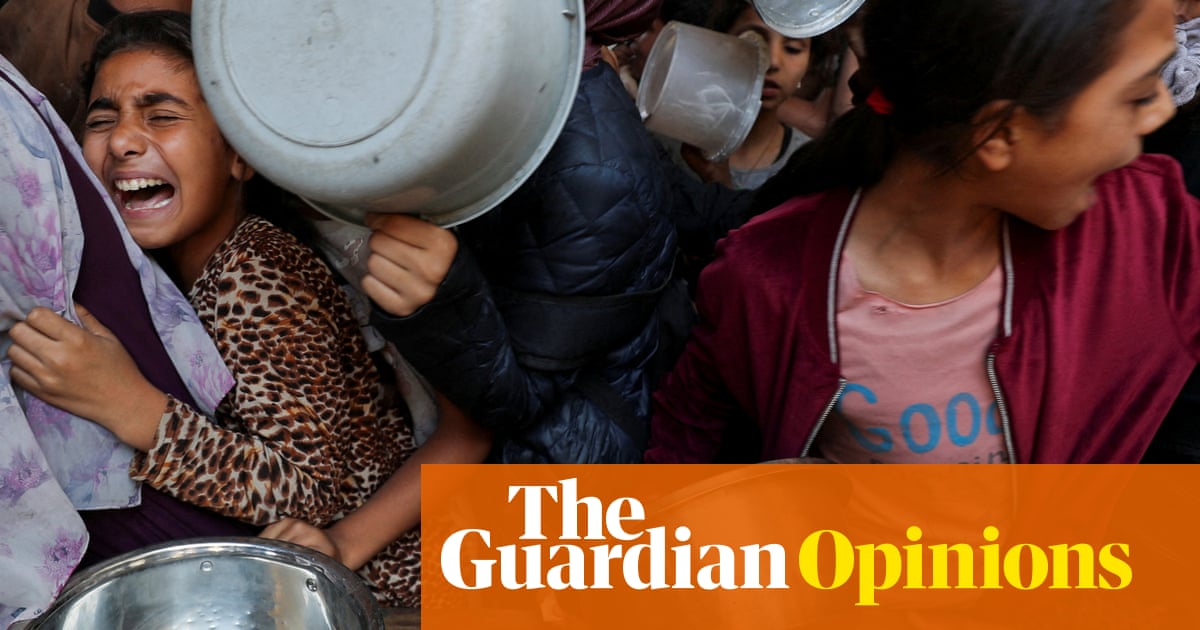On Monday, Israel launched an intensive ground offensive named Operation Gideon’s Chariots as part of itsplan to cause as much pain and damageas possible to everyone in Gaza. Israel hasannounced its intentto gain full indefinite control over Gaza, in effect aiming for annexation. This was after the international court of justice found Israel’soccupation of Palestinian territory illegaland demanded it end its occupation as rapidly as possible and provide full reparations to Palestinians.
Israel’s increased violence in the Occupied Palestinian Territory also comes after it denied all food, water and supplies from entering Gaza for over 75 days. In March,child acute malnutritionincreased by more than 80%. The price of wheat flour hasincreased by 3,000%since February. The World Food Programmeran out of foodfor kitchens in Gaza on 25 April and the World Central Kitchenclosed its operationson 7 May. If adequate aid does not enter Gaza immediately,14,000 Palestinian babies may die.
None of this is new, since Israel has been using hunger as a weapon against civilians in Gazasince 2000. When BenjaminNetanyahu announcedon 1 March that the “entry of all goods & supplies to the Gaza Strip [would] be halted”, he was flagrantly defying international law – snubbing the international criminal court warrant calling for his arrest for the war crime of starvation and the international court of justice provisional measures in March 2024 recognizing that famine and starvation was rampant in Gaza, creating a risk of genocide. Israeli officials, along with theUS ambassador to Israel, Mike Huckabee, have conditioned the provision of humanitarian relief to Palestinian civilians on Hamas’s release of hostages. Whilehostage-taking is bannedunder international law, there is no situation in which humanitarian aid to civilians can be used as a bargaining chip.
Last week, Hamas released Edan Alexander, the last living US citizen that they held. Soon after, on Monday, with Israel’s permission, the UN arranged fornine trucks to go to Gaza, followed by another 93 trucks on Tuesday.
This is welcome but still amounts to almost nothing. Before October 2023, 50% of people inGazawere hungry and 80% relied on humanitarian relief – and this was when 500 trucks of supplies were coming in every day. After 19 months of a starvation campaign, Palestinians in Gaza need a lot more than 500 trucks a day.
Israel has put forward an aid plan for Gaza that has beendescribed by the UN secretary generalas not based on international legal principles of humanity, impartiality, independence and neutrality but rather a system of “controlling and callously limiting aid down to the last calorie and grain of flour”.
Israel’s aid plan is designed to forcibly displace and concentrate Palestinians into southern Gaza all under the close screening and surveillance of mercenaries or Israeli armed forces. The UN has described the plan as a “military strategy” and a “deliberate attempt to weaponize aid”. Unicef has said that Israel is using aid as “bait” to lure civilians into militarized zones, forcing civilians to choose between “displacement and death”.
Last week,Tom Fletcher, under secretary general for humanitarian affairs and emergency relief coordinator,briefed the UN security councilon the humanitarian situation and the protection of aid workers in Gaza. Fletcher was very clear: “Israel is deliberately and unashamedly imposing inhumane conditions on civilians in the Occupied Palestinian Territory.” He described the Israeli-designed aid plan plainly: “It practically excludes many, including people with disabilities, women, children, the elderly, the wounded … It makes aid conditional on political and military aims. It makes starvation a bargaining chip. It is cynical sideshow. A deliberate distraction. A fig leaf for further violence and displacement.”
The US may be taking over the aid plan in Israel. The US government operation will be run by a private foundation, theGaza Humanitarian Foundation, and supported by Israeli military protection. This private foundation isopaquewith no clear details about its source of funding or how it will operate in Gaza. Regardless of who runs it, this “made in Israel” plan has beenrejected by the UNand has been determined by UN-supported experts to be a plan that willnot prevent famine. All this while hundreds of UN humanitarian trucks are at the Gaza borders ready to enter and take advantage of the long-standing relief networks. Recently, when an unarmed civilian ship tried to bring humanitarian aid into Gaza, it wasbombed by a dronein international waters in the Mediterranean Sea.
While Israel’s brutality and the US’s callousness aligns with their public statements, the international response has been slow and ghastly. On Monday, the UK, France, and Canadastated: “If Israel does not cease the renewed military offensive and lift its restrictions on humanitarian aid, we will take further concrete actions in response.” On Tuesday, the UK suspended trade negotiations with Israel. For 19 months I haveclosely followed the situation in Gaza, bearing witness to how 1 million children in Gaza have been starved by Israel. At this point, unsubstantiated political threats and suspended trade negotiations ring hollow.
Fletcher called upon the security council to act now to prevent genocide. But the security council is predictably debilitated by the US veto. What is to be done?
When the security council fails to act to a threat of peace or security because of veto, the UN charter empowers the UN general assembly to step in through what’s called the “Uniting for Peace” provision. Under this provision, the general assembly can pass a resolution calling for UN peacekeepers to accompany humanitarian convoys and deliver the necessary aid into Gaza, regardless of Israel’s plans and permissions. The UN general assembly must break the illegal blockade and stop the starvation of 2.3 million Palestinians.
Michael Fakhri is a UN special rapporteur on the right to food
